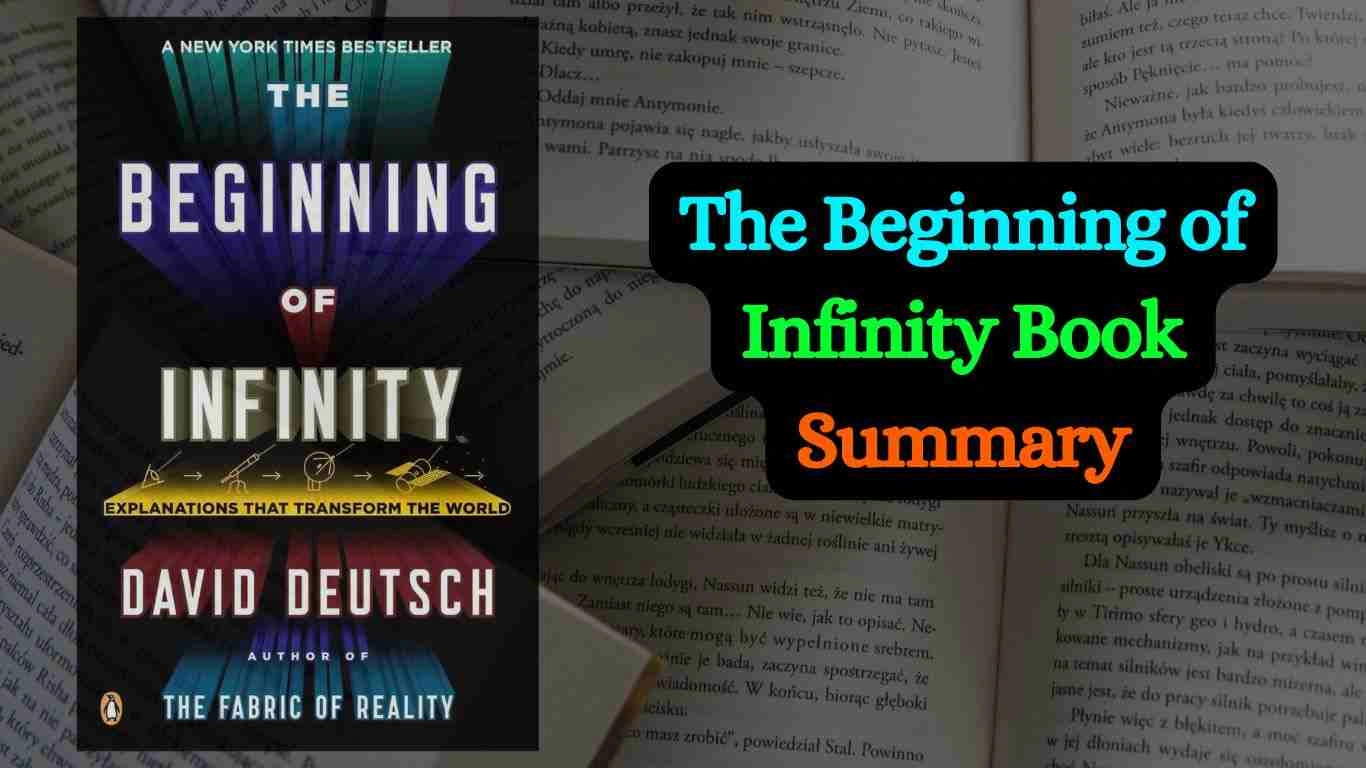Hello friends, in today’s blog, we see The Beginning of Infinity Book Summary, so you will understand the human capacity to think creatively.
Thinking Fast and Slow Book Summary
The Beginning of Infinity Book Summary
“The Beginning of Infinity” by David Deutsch is a thought-provoking exploration of knowledge, progress, and the infinite potential of human creativity.
Deutsch examines how understanding and explanations can lead to limitless progress in various domains.
Chapter 1: The Reach of Explanations
Deutsch argues that good explanations are the foundation of progress and understanding. He introduces the concept of universal reach—how explanations can extend beyond the specific situations they were created for.
- Key Idea: The power of human creativity lies in its ability to generate explanations that have no bounds.
Chapter 2: Closer to Reality
This chapter discusses the nature of scientific theories and how they are subject to continuous improvement. Deutsch critiques positivism and emphasizes realism, where scientific theories aim to describe reality, not just predict observations.
- Key Idea: Science progresses by correcting errors in our understanding of reality.
Chapter 3: The Spark
Deutsch examines the Enlightenment as a critical turning point in human history, emphasizing the shift to valuing reason, creativity, and critical thinking.
- Key Idea: The Enlightenment showed that the pursuit of knowledge and explanations is key to progress.
Chapter 4: Creation
The chapter explores how knowledge and creativity work together to transform ideas into tangible innovations. Deutsch discusses the importance of problem-solving and rejecting the idea of static solutions.
- Key Idea: Knowledge creation is a dynamic process fueled by creative problem-solving.
Chapter 5: The Reality of Abstractions
Here, Deutsch defends the importance of abstractions in understanding the world, arguing that concepts like numbers, ideas, and theories are real in their impact and utility.
- Key Idea: Abstract entities, though intangible, are essential for making sense of reality.
Chapter 6: The Jump to Universality
Deutsch introduces the idea of universal systems, such as the Turing machine, which can simulate any computation. This concept applies beyond computation, demonstrating that certain types of creativity and problem-solving have infinite reach.
- Key Idea: Universality is a hallmark of systems capable of infinite creative potential.
Chapter 7: Artificial Creativity
This chapter explores artificial intelligence and its limitations. Deutsch argues that true creativity is unique to humans because it involves the generation of new explanatory knowledge.
- Key Idea: Machines can simulate intelligence but lack genuine creativity.
Chapter 8: A Window on Infinity
Deutsch examines the nature of infinity and its role in physics, mathematics, and philosophy. He discusses the infinite potential of human creativity and the implications for knowledge creation.
- Key Idea: Human creativity opens a window to infinite possibilities in understanding and progress.
Chapter 9: Optimism
Deutsch explains that optimism is not naive positivity but a commitment to the idea that all problems are solvable through knowledge. He critiques pessimism as a barrier to progress.
- Key Idea: Optimism is the belief that problems are solvable, and progress is achievable.
Chapter 10: A Dream of Socrates
Through a Socratic dialogue, Deutsch discusses the importance of criticism and questioning in achieving deeper understanding and improving ideas.
- Key Idea: Critical discussion and questioning are essential for refining knowledge and achieving progress.
Chapter 11: The Multiverse
Deutsch delves into quantum mechanics and the many-worlds interpretation, arguing that multiple parallel universes exist and are a key part of understanding physical reality.
- Key Idea: The multiverse is a reality that helps explain quantum phenomena.
Chapter 12: A Physicist’s History of Bad Philosophy
This chapter critiques various philosophical positions, such as relativism and empiricism, that hinder progress. Deutsch defends rationalism and critical realism.
- Key Idea: Bad philosophy obstructs progress; rational, critical thinking enables it.
Chapter 13: Choices
Deutsch discusses the concept of choice in the context of free will and decision-making. He argues that choices are real and tied to the creation of knowledge and the solving of problems.
- Key Idea: The act of making choices is integral to progress and creativity.
Chapter 14: Why Are Flowers Beautiful?
Deutsch explores the role of beauty and aesthetics in human experience, emphasizing that beauty arises from explanations that resonate with human creativity and understanding. ( The Beginning of Infinity Book Summary)
- Key Idea: Beauty is linked to explanatory knowledge and creativity.
Chapter 15: The Evolution of Culture
This chapter examines how human cultures evolve through knowledge creation and innovation. He critiques static cultures and emphasizes dynamic cultures that embrace change and progress.
- Key Idea: Cultural evolution depends on the ability to create and share new knowledge.
Chapter 16: The Evolution of Creativity
Deutsch discusses the biological and cultural evolution of creativity, highlighting how it distinguishes humans from other species.
- Key Idea: Creativity is an evolutionary trait unique to humans, enabling limitless progress.
Chapter 17: Unsustainable
Deutsch critiques sustainability as a concept that often implies limits to growth and progress. He argues for problem-solving and innovation as the way forward, rather than imposing limits.
- Key Idea: Progress requires solving problems, not limiting growth.
Chapter 18: The Beginning of Infinity
The final chapter ties the themes together, emphasizing that progress and knowledge creation are unbounded. The “beginning of infinity” is the point at which human creativity continuously solves problems and opens new possibilities. (The Beginning of Infinity Book Summary)
- Key Idea: Humanity’s potential for progress is infinite, driven by creativity and the pursuit of explanations.
Key Themes and Takeaways
- Knowledge and Progress: Human creativity and the pursuit of explanations enable limitless progress.
- Optimism and Problem-Solving: All problems are solvable with the right knowledge and mindset.
- Critical Thinking: Progress depends on rational criticism and the refinement of ideas.
- Cultural Evolution: Dynamic, knowledge-embracing cultures thrive, while static ones stagnate.
- Infinity: Human creativity marks the beginning of infinite progress and possibilities.
Read more:-

[…] The Beggining of Infinity book summary […]